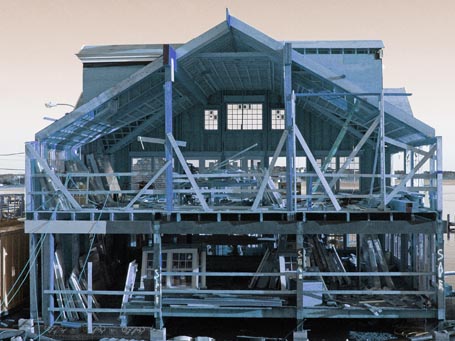At MAD through April 4, 2010
 Section image by Katie Hutchison Studio The image above captures a rare moment during construction when a building section, typically illustrated in an architectural drawing, is visible in reality on site.
Section image by Katie Hutchison Studio The image above captures a rare moment during construction when a building section, typically illustrated in an architectural drawing, is visible in reality on site.
The resolution of the building section in relation to the plans and elevations often drives the design of a building. I know it’s where I focus much of my attention when designing a home. I suppose the attraction is the third dimension, which I wrote a primer about here.
The building section is particularly concerned with the space we shape or carve above, below, and around us. I would argue that it’s the most experiential of the orthogonal drawings which architects include in construction drawing sets. Still, it describes a somewhat analytical experience.
Olafur Eliasson has created an artwork which allows that experience to migrate from the rational to the emotional realms of our minds. His creation Your House 2006 is on display as part of the “Slash: Paper Under the Knife” exhibit at the Museum of Arts & Design at Columbus Circle in Manhattan. The artwork is a 11.5” x 17.75” x 4.5” hand-bound book of 454 leaves (908 pages) in which each laser-cut leaf represents a cross section at a scale of 85:1 sliced through the artist’s house in Denmark at 2.2 cm intervals.
The cut-out sections create spatial voids within and between the pages. You can’t touch the book which is displayed in a Plexiglas case. But a monitor above it displays the turned pages in fast action, so the spaces carved from the pages appear animated, much the way a flip book brings still images to life. Flipping quickly through the pages of Your House allows you to experience the house's architecture as if you're traveling through it.
It captured my imagination as a dollhouse might. I peered into the book’s tiny carved rooms, stages for fanciful musings rich with architectural detail, and felt connected to this house on the other side of the Atlantic. In a 2009 TED talk Eliasson describes his work as being concerned with “making space accessible”. Indeed, he’s made the cerebral concept of the building section accessible in a new, playful and more tangible way. Later in the same TED talk Eliasson asks rhetorically, “How do we create an idea which is both tolerant to individuality and also to collectivity?” He answers his own rhetorical question via Your House; the artwork's individual leaves form the collective of the book which allows individual museum goers to collectively share the spatial story of the artist’s home.
by Katie Hutchison for House Enthusiast

